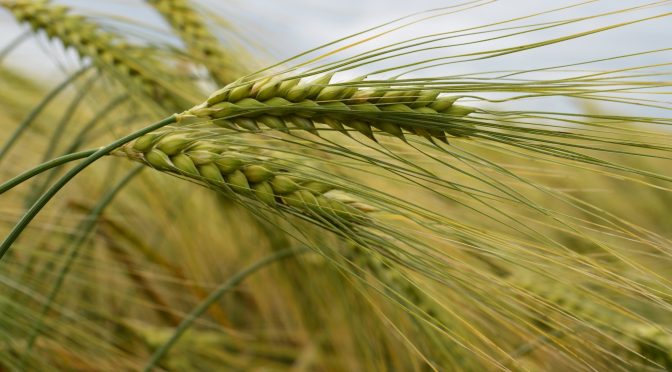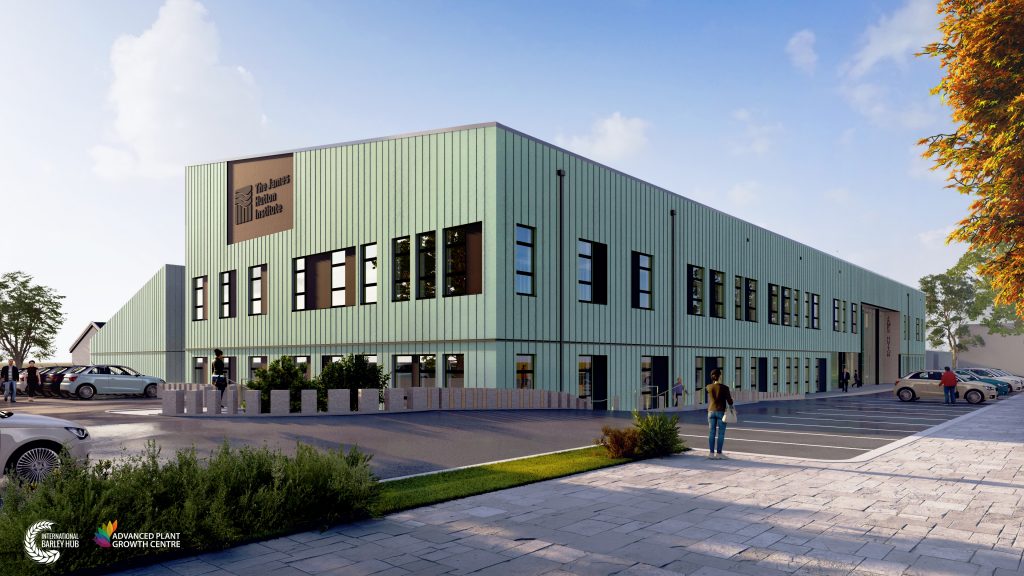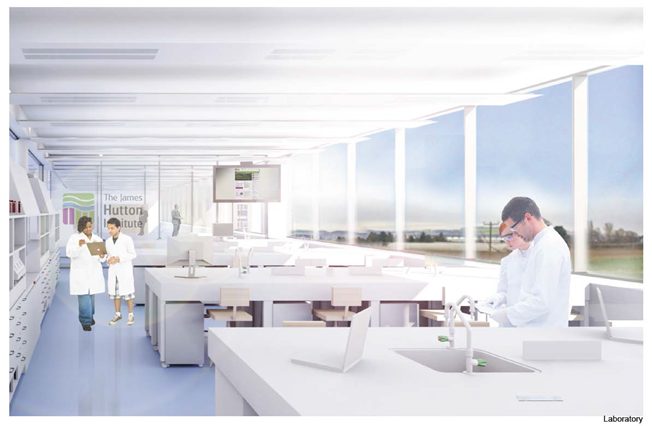
Building work has begun on the £62m International Barley Hub and Advanced Plant Growth Centre at the James Hutton Institute.
The two plant science innovation centres are being supported by £45 million from the UK Government and £17 million from the Scottish Government as part of the Tay Cities Region Deal.
With completion expected in early 2024, the centres will bring together industry and world-leading science to focus on solutions for the food and drink industry regarding climate change and a green recovery from the disruption caused by Covid-19.
The multi-million developments comprise state-of-the-art science, farm and field facilities, and a new access road. They are being delivered by Oberlanders and Wellwood Leslie Architects and construction business McLaughlin & Harvey under the Scape Major Works UK Framework.
The £35m International Barley Hub seeks to secure the long-term future of the barley sector by helping develop new varieties and growing systems that can cope with future climate change, plus new uses for the crop.
The project is underpinned by decades of research by the James Hutton Institute and partners, including the University of Dundee, SRUC and Abertay University, the Rowett Institute and others.
Businesses and sectoral interest groups such as the Scotch Whisky Research Institute, Maltsters’ Association of GB, and the National Farmers Union Scotland form part of the project consortium’s demand side.
Professor James Brosnan, Chair of the International Barley Hub, said: “There is real excitement and optimism about formally marking the physical beginning of the International Barley Hub.
“The centres will bring together world-leading science to focus on solutions for the food and drink industry”
The IBH complements the existing spirit of collaboration in the barley supply chain and will provide the answers to our shared climate challenges through applied scientific excellence. This is indeed a significant milestone to have reached, and we look forward to seeing this project become a reality.”
The £27m Advanced Plant Growth Centre aims to revolutionise crop production systems to produce food locally, 365 days a year, with less environmental impact. Such systems can be completely independent of the weather or availability of agricultural land, for example, indoor vertical farms using LED lights that have full environmental control and are located close to the population on unused derelict land. APGC will support a rapidly expanding industry with 25% annual growth and an estimated worth of $12bn by 2026.
Professor Derek Stewart, Director of the Advanced Plant Growth Centre, added: “Today’s milestone reflects the aim of the APGC to break new ground in many areas related to our quality of life. This Centre will allow us to develop and translate science that will lead to new production systems like vertical farming, more accurately model climate change and its implications for plant and crop products such as food, pharma etc, and support food security through crop storage.”
Combined, the two projects aim to create over 470 jobs in the Tayside region and a further 2,200 jobs across the wider Scottish and UK economy, demonstrating the true national importance of the two initiatives.
Breaking-ground Ceremony
To mark the commencement of the works formally, a breaking-ground ceremony was held at the James Hutton Institute campus in Invergowrie, led by both Mairi Gougeon MSP, Cabinet Secretary for Rural Affairs and Islands and Iain Stewart MP, Under-Secretary of State for Scotland, and joined by project stakeholders and supporters.

Rural Affairs Secretary Mairi Gougeon said: “I am delighted to be helping to mark this important first step towards realising our £17 million investment in new facilities at the James Hutton Institute through the Tay Cities Region Deal.
“The Institute has ambitious plans for the future, combining its world-leading research with a real commitment to inclusive growth and sustainable food production for the future. We are committed to supporting research and innovation in agriculture to help keep Scotland at the forefront globally of action on food security through projects like the International Barley Hub.”

UK Government Minister for Scotland Iain Stewart said: “These exciting projects will place Scotland at the forefront of agricultural innovation, ensuring our food and drink production remains dynamic, sustainable and secure. The UK Government is contributing £45 million to these projects through the Tay Cities Deal, which is bringing new jobs and investment to the region.”
The Tay Cities Deal is a £700 million, 10-year regional investment partnership between governments and public and private organisations across Perth & Kinross, Angus, Dundee, and northeast Fife.
Councillor John Alexander, chair of the Tay Cities Deal joint committee, said: “These two flagship projects embody the innovation and sustainability which lie at the heart of the Deal.
I’m excited to see these world-leading research hubs starting to grow at the heart of the Tay Cities Region.
I look forward to seeing the centres contribute to solving the huge challenges of our time, including climate change, food security and a green recovery from the global pandemic while supporting jobs in the region and beyond.”
About The James Hutton Institute
The James Hutton Institute is a world-leading scientific organisation encompassing a distinctive range of integrated strengths in land, crop, waters, environmental and socio-economic science. It undertakes research for customers including the Scottish and UK governments, the EU and other organisations worldwide. The Institute has over 500 employees and 120 PhD students, and with associated bodies and spin-out companies there are over 750 people working on Hutton campuses.
The James Hutton Group comprises the Institute, The Hutton Foundation and its commercial subsidiary, James Hutton Limited (JHL), which is the vehicle for translating and commercialising the scientific expertise, intellectual property, facilities and resources of the Institute. JHL offers customers a comprehensive range of analytical, research and development, crop breeding, and consultancy services drawing on the full range of expertise in the Institute.
The Institute takes its name from the 18th century Scottish Enlightenment scientist, James Hutton. He changed the way we think about our world with deep insights into land, soils, crops and the climate and is widely regarded as the founder of modern geology.
More information at: www.hutton.ac.uk
